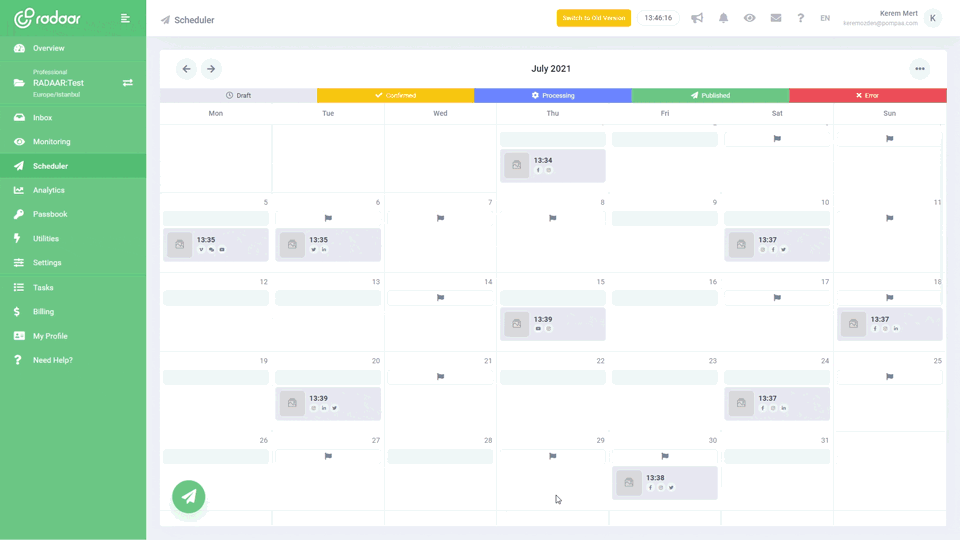Looking for business growth? Have you considered harnessing the power of social media data?
Discover how leveraging social media data can unlock new business growth opportunities through targeted marketing strategies and consumer insights. Dive into our blog post to explore actionable tips and real-world examples that highlight the transformative power of social data.
LEARN MORE LAUNCH DEMO NOW In today's fast-paced digital landscape, businesses are constantly seeking innovative ways to stay ahead of the competition and drive growth. One of the most powerful tools available at your fingertips is social media data, an invaluable asset that often flies under the radar. Harnessing the potential of this dynamic resource can provide deep insights into consumer behavior, market trends, and competitor strategies. Whether you're a small startup or a large corporation, understanding how to effectively utilize social media data can propel your business forward in unprecedented ways.
Imagine being able to anticipate market shifts, tailor your marketing strategies with pinpoint precision, and engage with your audience on a deeper level. By tapping into the vast ocean of information that social media platforms offer, businesses can unlock doors to new opportunities and more personalized customer interactions. In this blog post, we'll explore how leveraging social media data can transform your business strategy, from identifying key influencers in your industry to understanding the sentiments behind customer reviews. Are you ready to discover how social media data can become your secret weapon for business growth? Let's dive in and uncover the untapped potential that lies within your social media channels.
Imagine being able to anticipate market shifts, tailor your marketing strategies with pinpoint precision, and engage with your audience on a deeper level. By tapping into the vast ocean of information that social media platforms offer, businesses can unlock doors to new opportunities and more personalized customer interactions. In this blog post, we'll explore how leveraging social media data can transform your business strategy, from identifying key influencers in your industry to understanding the sentiments behind customer reviews. Are you ready to discover how social media data can become your secret weapon for business growth? Let's dive in and uncover the untapped potential that lies within your social media channels.
Table of Contents
- Why is collection of social media data crucial?
- What types of social media data should you collect?
- How to effectively collect social media data?
- How to analyze the collected social media data?
- What insights can social media data offer you?
- How can social media data influence your strategy?
- How to use social media data for decision making?
- Do mistakes happen when using social media data?
- Ready to leverage social media data for your business growth?
Why is collection of social media data crucial?
In today's digital age, the collection of social media data is crucial for businesses aiming to grow and thrive. By tapping into this rich source of information, companies can gain valuable insights into consumer behavior, preferences, and trends, enabling them to tailor their marketing strategies more effectively. Social media data allows for real-time feedback, helping businesses swiftly address customer needs and stay ahead of the competition. Moreover, analyzing this data can uncover new opportunities for engagement and drive greater brand loyalty, ultimately supporting sustainable business growth.
What types of social media data should you collect?
When diving into the world of social media data for business growth, it's crucial to collect various types of data to gain a comprehensive understanding. Start by gathering engagement metrics like likes, shares, comments, and mentions, which provide insights into how your audience is interacting with your content. Don't overlook demographic data, such as age, gender, and location, as these details help tailor your marketing strategies to better reach your target audience. Lastly, sentiment analysis of customer feedback and reviews can unveil public perception about your brand, guiding improvements and innovation in your products or services.
How to effectively collect social media data?
To effectively collect social media data, the first step is to identify your objectives—what are you trying to learn or understand from the data? Whether you are aiming to comprehend consumer sentiments, track brand mentions, or analyze competitors, having a clear purpose will guide your data collection process. Select the right platforms where your target audience is most active, ensuring that your efforts are channeled where they yield the most significant impact. This targeted approach saves time and resources, ensuring that the data you collect aligns with your business goals.
Once you've set your objectives and chosen your platforms, leverage the right tools to streamline data collection. Tools like Hootsuite, Sprout Social, or specialized social listening tools such as Brandwatch can automate the process, gathering data on engagement metrics, trending topics, and audience demographics. Additionally, the use of Application Programming Interfaces (APIs) offered by platforms like Twitter and Facebook can provide more in-depth access to social media data. Always ensure compliance with privacy regulations when collecting this data, respecting user confidentiality and platform rules to build trust and maintain ethical standards in your data handling practices.
Once you've set your objectives and chosen your platforms, leverage the right tools to streamline data collection. Tools like Hootsuite, Sprout Social, or specialized social listening tools such as Brandwatch can automate the process, gathering data on engagement metrics, trending topics, and audience demographics. Additionally, the use of Application Programming Interfaces (APIs) offered by platforms like Twitter and Facebook can provide more in-depth access to social media data. Always ensure compliance with privacy regulations when collecting this data, respecting user confidentiality and platform rules to build trust and maintain ethical standards in your data handling practices.
How to analyze the collected social media data?
To effectively analyze collected social media data, start by identifying the key metrics that align with your business goals, such as engagement rates, follower growth, and sentiment analysis. Utilize social media analytics tools like Hootsuite or Sprout Social to gather comprehensive reports that highlight trends and patterns. Dive deeper by segmenting the data based on demographics, location, or interests to tailor your marketing strategies more precisely. Finally, use this insightful data to refine your content strategy, targeting areas that promise the highest returns and meeting your audience's needs more effectively.
What insights can social media data offer you?
Social media data offers a treasure trove of insights that can lead to tangible business growth. By analyzing trends, sentiments, and user engagement patterns, businesses can tailor their strategies to better meet customer needs and drive more meaningful interactions. This data helps in identifying popular industry influencers and potential brand advocates who can amplify your brand message effectively. Moreover, understanding customer sentiment can guide product development and enhance customer service, creating a more customer-centric business approach.
How can social media data influence your strategy?
Social media data is a treasure trove of insights waiting to be mined for your business's strategic advantage. By analyzing social media trends, engagement, and audience demographics, you can tailor your marketing efforts to better meet customer preferences and expectations. This data can reveal which content resonates most with your audience, allowing you to focus your efforts on strategies that maximize engagement and conversion. Moreover, understanding these patterns not only helps refine your existing offerings but can also inspire innovative ideas for new products or services.
Beyond marketing, social media data also enhances customer relationship management. Listening to customer feedback and monitoring brand mentions provides an opportunity to address concerns proactively and strengthen customer loyalty. Additionally, tracking competitor activity through social media offers a competitive edge, enabling you to adapt to industry shifts quickly. Embracing the potential of social media data means aligning your business strategy with real-time insights, ultimately leading to smarter decisions and sustainable growth.
Beyond marketing, social media data also enhances customer relationship management. Listening to customer feedback and monitoring brand mentions provides an opportunity to address concerns proactively and strengthen customer loyalty. Additionally, tracking competitor activity through social media offers a competitive edge, enabling you to adapt to industry shifts quickly. Embracing the potential of social media data means aligning your business strategy with real-time insights, ultimately leading to smarter decisions and sustainable growth.
How to use social media data for decision making?
Utilizing social media data for decision-making involves analyzing user interactions, comments, and engagement metrics to gain insights into consumer behavior and preferences. By tracking trends and listening to audience feedback, businesses can tailor their marketing strategies and product offerings to better meet customer needs. This data-driven approach helps in identifying potential new markets, refining targeting strategies, and optimizing content to enhance overall brand performance. Ultimately, leveraging social media data empowers companies to make informed decisions that fuel business growth and enhance customer satisfaction.
Do mistakes happen when using social media data?
Mistakes can certainly happen when using social media data, but being aware of common pitfalls will help you navigate them more effectively. One error is over-relying on data from a single platform, which can lead to a skewed perspective; it's important to gather insights from multiple sources for a more comprehensive view. Another mistake is failing to verify the accuracy of data; social media analytics tools can sometimes offer misleading metrics, so cross-checking with reliable software is crucial. Lastly, overlooking the context of user interactions can lead to misunderstandings—taking time to analyze sentiment and engagement meaningfully will lead to more informed business decisions.
Ready to leverage social media data for your business growth?
In today’s digitally-driven landscape, leveraging social media data is no longer just a beneficial strategy; it’s essential for any business striving for substantial growth. By tapping into the vast amounts of data generated every day, businesses can gain invaluable insights into consumer behavior, preferences, and trends, empowering them to make informed decisions. This data provides a detailed snapshot of your audience, allowing you to tailor your products, services, and marketing efforts to meet their needs effectively. Moreover, using social media data can help identify new markets and opportunities that may have otherwise gone unnoticed, driving innovation and expansion in unprecedented ways.
So, are you ready to harness the power of social media data for your business growth? By embracing this wealth of information, you set your business on a path of continual learning and growth, positioning yourself strategically in an ever-competitive market. Start by identifying the social media metrics most relevant to your business goals, and don't hesitate to experiment with emerging tools and platforms. Remember, the digital age favors those who are proactive and adaptable, so use social media data not just as a tool but as a fundamental component of your business strategy. The immense potential of social media data awaits, ready to propel your business forward with every like, share, and comment.
So, are you ready to harness the power of social media data for your business growth? By embracing this wealth of information, you set your business on a path of continual learning and growth, positioning yourself strategically in an ever-competitive market. Start by identifying the social media metrics most relevant to your business goals, and don't hesitate to experiment with emerging tools and platforms. Remember, the digital age favors those who are proactive and adaptable, so use social media data not just as a tool but as a fundamental component of your business strategy. The immense potential of social media data awaits, ready to propel your business forward with every like, share, and comment.
SOCIAL MEDIA SCHEDULER
Plan and publish...
Plan and publish your content for Facebook, Instagram, Twitter, and LinkedIn from one simple dashboard.
LEARN MORE FREQUENTLY ASKED QUESTIONS
What is social media management platform?
RELATED BLOG POSTS
All the tips & tricks you'll need...
Get the fresh tips and tricks you'll need to ace social media marketing.












